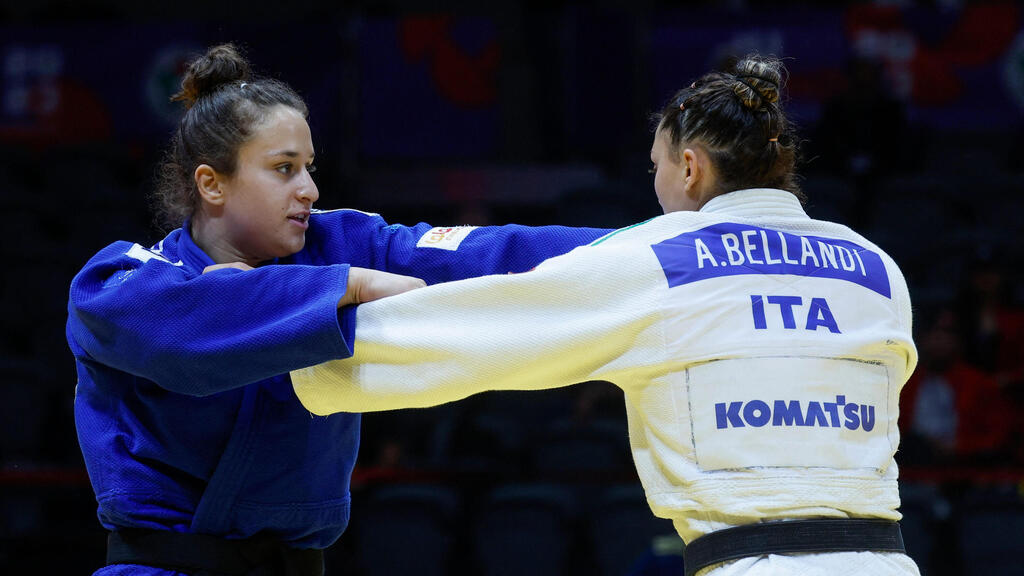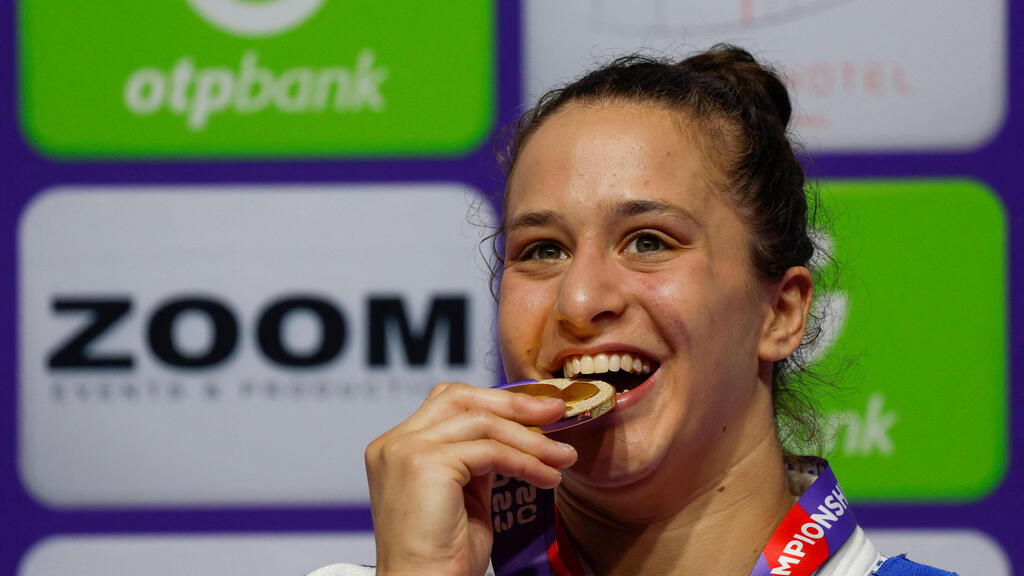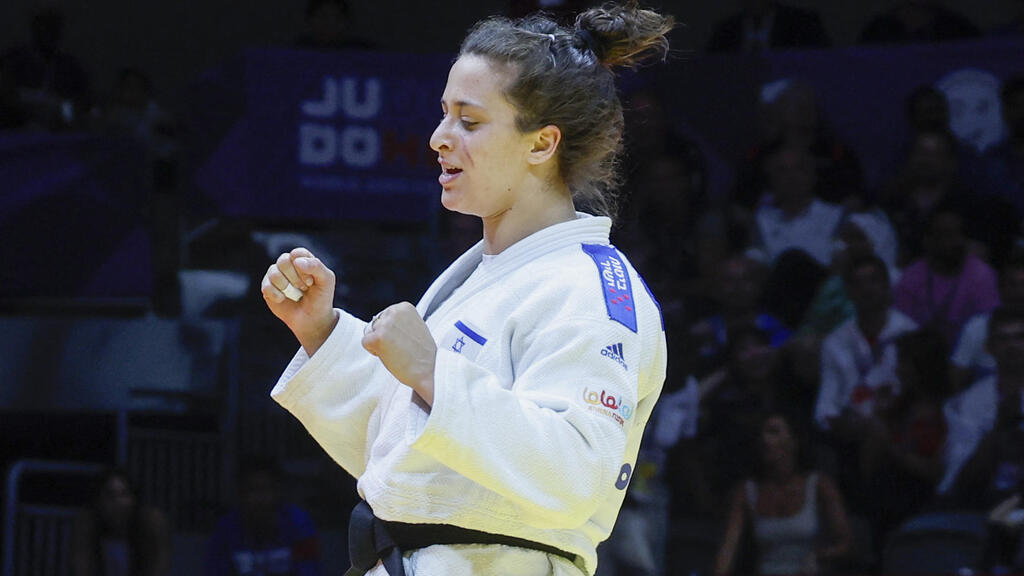Getting your Trinity Audio player ready...
Inbar Lanir was unknown to most sports fans in Israel, but as of Friday she has to start getting used to her new status: World Champion.
More Stories:
All the talent of the girl from central Israel's Yehud, who was debating whether to choose ballet or judo, erupted on an amazing day of fighting which she finished with a gold medal around her neck and the playing of the national anthem Hatikva on Qatari soil – all after she defeated, one by one, her major rivals.
"I am happy to dedicate the medal to the residents of the south, who are going through a difficult time, to the soldiers of the Israel Defense Forces and to the entire State of Israel. It was so important for me to do something good in such complex and difficult days," said the 23-year-old Jewish judoka, after her dramatic victory in the 78 kg final over Frenchwoman Audrey Tschumeau.
It was the first time in her senior career that Lanir stood on the first place podium, and there is nothing sweeter than doing it in the most prestigious international competition. Although she was marked from a young age as a potential star, she was not able to make the long-awaited breakthrough since she won the European Under-23 Championship three years ago.
In the eyes of the Qatari audience, though, exactly at the moment of truth – about a year before the Paris Olympics – everything was released and Israeli judoka received a tremendous shot of encouragement.
The achievement came during a difficult year for the Jewish athlete. In the previous world championship she was eliminated in her first fight, and her participation in the Tel Aviv Grand Slam ended in tears after she lost in the battle for bronze. On Friday, the tears that flowed were of pure happiness. And how could she not be? She is the second Israeli woman in the sport to be crowned world champion, after her role model Yarden Gerbi did it 10 years before her.
A winning bet
Lanir is considered an attractive judoka, one who tends to take risks in matches. It can lead her to impressive wins like in Doha, or end up in a quick loss as has happened to her quite a few times. This time the bet had a big payoff: She was aggressive in all five of her bouts and showed particularly good offense. It was not a tactical style, and she did not try to extract penalties from her opponent.
Lanir was born in Yokne'am in northern Israel before moving with her family to Yehud, where she began her journey in judo. As a young girl, it was not clear what direction she would take. She loved ballet very much, but when she got on the judo mat for the first time it was clear that this was something to consider.
At a certain point her mother pressured her to give judo a chance in light of the positive feedback she received from the coaches. And so, Lanir would come to training in ballet clothes, throw a white uniform over them, and immediately become a tough warrior. Lanir says that ballet actually helped her in judo and improved her ability to move.
Lanir acknowledges that she was a hyperactive child, so she also experimented with sports such as floor gymnastics and aerial acrobatics, but judo attracted her more than anything - even though she was still in a dilemma. Her childhood coach, Shimi Assor, said: "Inbar came to training in ballet clothes and told me that she was debating whether to quit because she was told that judo is a boy's sport. I told her that soon there will be the Israeli judo championships, and let's see what happens after that."
In a post she published on Instagram, Lanir spoke openly about dealing with body image as a female judoka: "I wasn't ready to lift a barbell that weighed more than 2 kg. and whose color wasn't pink. I was afraid to be muscular. I was afraid to look masculine. It was important to me to be beautiful; my dream was that the boys in the class would fight over who would invite me to slow dance at the bat mitzvah. I believed that if my hands were bigger than theirs, it would lessen my chances."
Lanir went on to describe the moment she decided to change course: "My mother took me to see the Israel Senior Championships. I sat there mesmerized. The matches did not interest me at that moment. My eyes were locked on the sidelines where all the athletes of the national team were gathered. I studied every millimeter of their bodies, which of course were covered in judo suits, which made me continue my detective work at home. I memorized their names and looked them all up on Facebook. I went through photo after photo until I found one athlete who had a photo in a dress. And she looked just great. I was really surprised. She was very feminine and cute, and she had muscles, but she was really beautiful. A week later I went to the gym and started lifting weights. My arms grew bigger, and the terrible disaster I feared did not happen."
Lanier adds that "I continued to dress the way I like, and dress up and put on makeup, and feel feminine and beautiful. To this day, I stand in front of the mirror and flatter myself. Because my muscles are my most beautiful jewelry. So, I'm writing this post for the 12-year-old girl I was. For those girls who are debating whether to take the heavier weight because they are afraid of how their body will look. Being strong is so beautiful, and true beauty comes from within. And when you stand with the medal around your neck in the most important competition of your life, you will thank yourself for the decision to choose to be strong."
Hard work to go pro
So, Lanir overcame her fears and found herself on Israel's national team at the age of 13. Of course, the commitment to becoming a professional judoka had a price: the competitions on Saturday, giving up the annual school trips and parties on the weekends. She was absent from high school quite a bit due to morning training, but in the end she finished her high school requirements on her own.
In the army, Lanir received the status of outstanding athlete and served as a triathlete. At the age of 18, she moved to Wingate Academy - The National Institute For Sport Excellence with her friends from the national team. In judo, she is part of a cohesive and high-quality team, which includes Raz Hershko, Maya Goshen, Gili Sharir, Gefen Primo, Timna Nelson Levy and Shira Rini.




